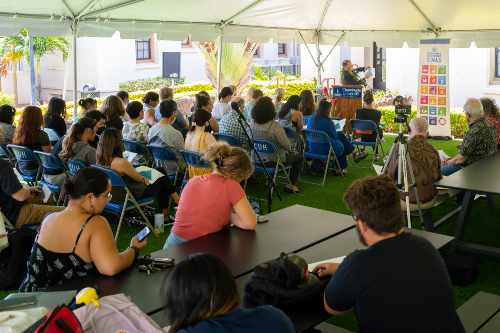Freshmen students help in Palolo Stream cleanup
Empty bottles and cans. Cartons and styrofoam containers. A neon pink plastic ball. These were just some of the debris littered along the banks of Palolo Stream. Huddled below a large banyan tree above the flotsam and jetsam, John Watase and Hideki Kimukai said they’ve seen worse—even in just the past couple of days.
Pointing to a group of Dr. Lupita Ruiz-Jones’s ENV 100 students as they climbed down a slope to reach the banks of the stream, Kimukai said, “they have no choice,” referring to students’ responsibility of being good stewards of the aina.
“They represent the future,” said Kimukai, an Education Specialist + Japanese Education Program Lead with Sustainable Coastlines. “They’re the ones inheriting this earth. They’ll be the ones to fight for climate change, and they’ll be the ones affecting and writing policies.”

An environmental teacher with Saint Louis School, Watase is urgently sounding the alarm bells, not only about the stream but the state of the environment. “I don’t know what people are thinking when they’re tossing their trash,” said Watase, who graduated from Saint Louis in 2006. “I’ve seen so much waste that’s simply inexcusable.”
Before setting off along a wooden path that Watase helped build, Ruiz-Jones instructed her students to grab some gloves and trash pickers, warning them of the challenges they might encounter during the hour-long cleanup, including large pieces of debris and the foul stench.
“In this short amount of time, you can make a difference,” said Ruiz-Jones, encouraging her students to participate in other cleanups around the island. “It’s not easy work; it’s hard, but you’re contributing to the solution, and helping to prevent rubbish from making its journey to the ocean.”
A 10-year service member and veteran of the Army, LaVelle White ’26 quickly filled his bag with plastic bottles, aluminum cans and other rubbish even before he reached the banks. “I’ve volunteered on a couple of cleanups around the island,” said White, a freshman who is using the GI Bill to earn a Chaminade degree. “And I’ve also participated in cleanups in Oklahoma and San Antonio. It’s my way of contributing to the community, wherever that may be at the time.”
In her ENV 100 class, Ruiz-Jones introduces students to rudimentary environmental issues, providing them theory in the classroom and practicum outside the campus with such experiential opportunities as the Palolo Stream Cleanup, a Beach Cleanup in Waimanalo and internships with nonprofit organizations.
“At the Maunalua Fishpond Heritage Center, for example, students are collecting data and using their findings to help restore the fishpond,” explained Ruiz-Jones, whose passion for the environment was sparked when she attended a Bioneers Conference in Northern California when she was in high school. “This is what service learning looks like. It connects student learning in the classroom with real-world experiences in the community.”
At Saint Louis, Watase teaches his students all about composting, from permaculture to vermicompost. It’s a matter that’s close to his heart since he runs his own farm in Waialua. The Palolo Stream is also spiritual for him, which is the reason he leads his students on regular cleanups along the banks.
“The ultimate goal is to restore the path and manage the debris in the stream,” Watase says. “We’re also trying to rid of the invasive fish to give ‘o‘opu (the Hawaiian word for fish in the goby family) a chance to thrive. The last fish cleanup we did in the stream, we caught 1,700 fish in a few hours. And of the 1,700, only four were ‘o‘opu and the rest were tilapia, small-mouth bass and lots of catfish—all invasive.”
As students scaled back to the top of the embankment, Kimukai commented that he wants to teach students “to re-learn what they’ve learned.” “I enjoy talking story with students of all ages, from K to K—keiki to kapuna,” he said. “We try to inspire the kids and be inspired by them. They can change the future, as long as they have the mindset.”














